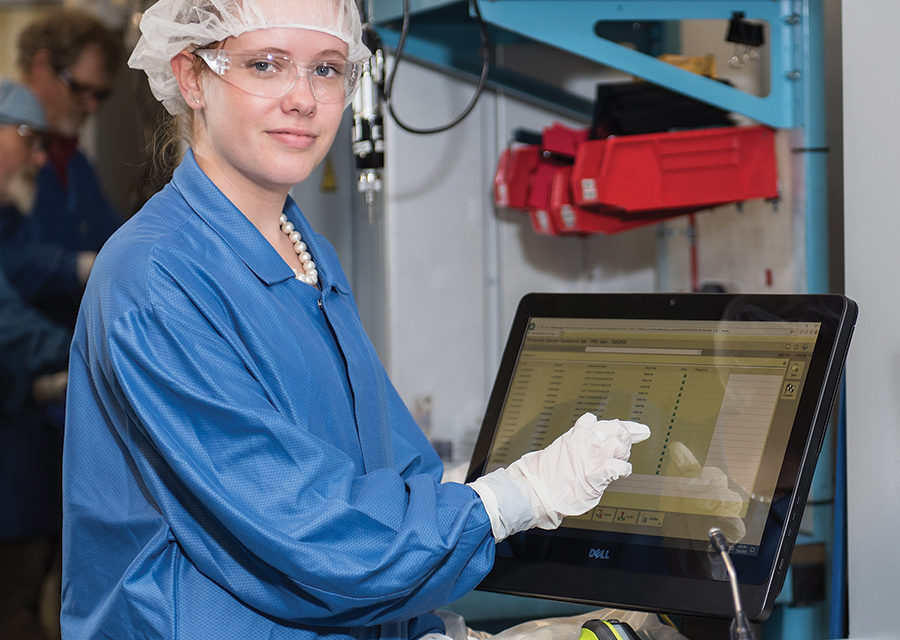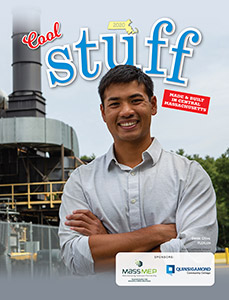Schools and manufacturers are developing programs for high schoolers to learn by doing
Lebanon High School senior Teresa Dubuque is still not quite sure what she wants to do when she graduates in 2019. Luckily for her, she says, a new internship program launching this fall, will allow her to do some exploring before she takes that long walk across the gradua-tion stage.
Teresa Dubuque, 17
Senior, Lebanon High School
Interning at: Fujifilm, Lebanon
Lives: Lebanon
Goals: Not sure yet, that’s part of why I’m doing my internship so I can get a little guidance.
Multi-talented: I am ambidextrous.
“Part of the point of doing the internship is to help guide you into wherever you want to go,” she says of the internship program where two school districts and two manufacturing firms – Fujifilm Dimatix in Lebanon and Hypertherm Inc, in Hanover – have partnered to give students a chance to work in various areas of each business during the school day in exchange for high school credit.
“We’re going to be exploring a lot of different parts of the companies, and I like that idea that I get to see production and engineering as well as like HR and marketing and stuff,” Dubuque says, “It’s kind of like a variety.”
Hands-on learning
This program is indicative of a trend in New Hampshire of manufacturing firms and educators teaming up to offer students not just the book learning they need for their future, but hands on experience of working in a professional manufacturing setting.
This trend is more than a decade in the making, says Fred Bramante, former chairman of the New Hampshire Board of Education and president of the National Center for Competency Based Learning.
In 2005, the New Hampshire Board of Education repealed what was called the Carnegie Rule, which was a requirement mandating students had to receive 180 hours of in-class instruction in order to qualify for graduation. Bramante says the board made changes allowing students to get credit for experiential learning outside the classroom and outside of the school system. Still, he says, not every school district has embraced this change by offering experiential learning opportunities to students.
More opportunities
However, that is changing, says Matthew McKenney, workforce development manager at Hypertherm. McKenney says both the landscape of education and the perception of manufacturing has changed in the past decade, due in part to companies doing a better job explaining what it is they do and that jobs in this sector are high paying, high tech and clean. Furthermore, he says, the influx of automation and the demand for skill sets in and around programming has increased, which is help-ing educators realize the relevance of learning those skills.
Students are reaping the benefits of this change. For example, because Cirtronics in Milford – a contract manufacturer for electronics and box builds building for quality-sensitive markets including medtech, communications, military, security and robotics, realized the importance of engaging a new generation of worker, the company has spent the past several years developing a relationship with Milford High School, says Jessica Kinsey, the career development manager at Cirtronics. This has allowed the firm to handpick students for paid internships that, for at least two students, translated to high school credit and job summer job offers with the company.

Milford High School 2018 graduate Amber Roadcap, 18, says her experience as an engineering intern with Cirtronics helped her to decide that of all her engineering prospects, she preferred mechanical engineering and so, will pursue that this fall at Wentworth Institute of Technology in Boston. The internship led to a summer job opportunity in assembly, she says.
“What I learned is that for being a mechanical engineer, I want to work on design so the manufac-turing part really helped me understand how things are made. So I can design better,” says Roadcap. “It was really a valuable experience. It’s really awesome too, that as a high school student, you get professional work experience before you even go to college and get your degree.”
Amber Roadcap, 18
Milford High School graduate, 2018; freshman, Wentworth Institute of Technology
Interning at: Cirtronics Corp., Milford
Title: Mechanical manufacturing engineering intern
Lives: Milford
Goals: Amber plans to go to school to study mechanical engineering. She hopes to become an automotive engineer after she graduates.
Going fast: She decided to pursue mechanical engineering in the automotive industry because of a love for formula one racing, which she watched a lot of with her dad.
Developing different skills
Likewise, fellow Milford High 2018 graduate Ryan Arseneault, 18, who is planning on studying actuari-al mathematics at Bryant University in Rhode Island in the fall, says his experience working in Cirtronics accounting department helped him realize how many options for jobs he really has.
Ryan Arseneault, 18
Milford High School graduate, 2018; freshman, Bryant University in Rhode Island
Interning at: Cirtronics Corp., Milford
Title: Accounting clerk intern
Lives: Milford, NH
Goals: Get a bachelor’s degree in actuarial mathematics and then get a job as an actuary
Shooting hoops: I like to play basketball.
“The people doing the assembly are one of the big portions of the company, but I also realized how important every group is, like finance, account managers and things like that,” he says, “I never realized how crucial their positions are to the company’s success.
“Whenever I would think of accounting, I would think of an accounting firm, but every company needs some type of finance group so it’s kind of like you could squeeze in there.”
And that’s one of the many benefits manufacturing officials are hoping students get from the new cooperative internships launching this fall.
“The expectation is that this will help them with their career path, whether it expands their knowl-edge in a specific field for college or whether it helps them enter the workforce,” Lucy Lesperance Glaude a human resources generalist with Fujifilm Dimatix, Inc, in Lebanon. “We hope to give them some tools for the future.”
As part of the Hypertherm/Fujifilm program, students will earn a total of two credits in math, sci-ence and an elective for their participation. Lesperance Glaude says 16 students – eight from Lebanon High School, and eight from Thetford Academy in Vermont – will rotate through various Hypertherm and Fujifilm departments to develop an overview of the opportunities in the manufacturing industry. The students will spend eight weeks at both locations for a total of 16 weeks.
“The students will participate in the work,” McKenney of Hypertherm says, “but there’s a rigor-ous curriculum that’s designed to expose them to each component of the design and sale of a product.”
New programs
A similar program is also launching at Velcro this fall. Dirk Foreman, president for North America for Velcro Cos. says the Velcro University curriculum will be based on a combination of hands-on class-room learning and in-factory experiential learning.
“Our belief is that this learning combination accommodates and accelerates learning based on student preference, be it audio, visual or experien-tial,” he said in a written statement to STUFF. “We will offer a phased learning approach to ensure stu-dents can progress based on their individual capa-bilities and desires. Our goal is paced comprehen-sion, designed to leave no student behind.”
He says potential courses include: essentials, business acumen, Velcro culture and technical acu-men. The program will provide an internship, com-munity service and help with job placement skills.
Going forward, McKenney says he hopes these pilot programs are just the first of many offered to students around the state.
“There are many other schools interested but we had to limit it for the pilot,” he says. “How we would scale this up is to get more businesses involved … There is interesting momentum in that space. But ultimately that’s the goal is for it to be much larger and our hope is for it to be much broader.”



